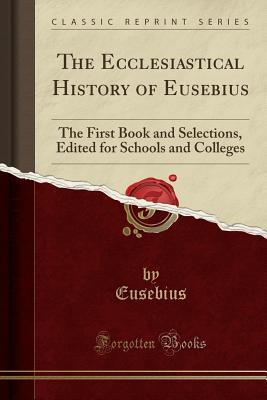Read The Ecclesiastical History of Eusebius: The First Book and Selections, Edited for Schools and Colleges (Classic Reprint) - Eusebius Eusebius file in ePub
Related searches:
Eusebius' Ecclesiastical History: Complete and Unabridged
The Ecclesiastical History of Eusebius: The First Book and Selections, Edited for Schools and Colleges (Classic Reprint)
Eusebius' Ecclesiastical History (Greek and English) - Accordance
Eusebius' Ecclesiastical History - Complete and Unabridged
Eusebius and Empire - Cambridge University Press
Eusebius' ecclesiastical history is one of the classics of early christianity and of equal stature with the works of flavius josephus. Eusebius chronicles the events of the first three centuries of the christian church in such a way as to record a vast number of vital facts about early christianity that can be learned from no other ancient source.
In historiography: the early christian conception of history whose historia ecclesiastica (written 312–324; ecclesiastical history) was the first important work of christian history since the acts of the apostles. For eusebius, the roman empire was the divinely appointed and necessary milieu for the propagation of the christian faith.
Author: eusebius title: eusebius' ecclesiastical history plot: the history of the christian church from christ ~0 to ~335 ad there are three easy ways to do this study: click the play button starting with part 1 on the audio players below (note: if you'd prefer, you can also listen to them on apple or google).
But eusebius's chief fame rests on the history of the christian church in ten books published in 324–325, the most important ecclesiastical history of ancient.
The ecclesiastical history of eusebius pamphilus, bishop of cesarea, in palestine item preview.
A classic of early christianity equal to the works of flavius josephus. 260-340) chronicles the events of the first three centuries of the christian.
Eusebius chronicles the events of the first three centuries of the christian church in such a way as to record a vast number of vital facts about early christianity that.
One of many possible examples is in the life of constantine as compared with the ecclesiastical history.
Greek historiography, roman society, christian empire: the ecclesiastical history of eusebius of caesarea addresses a major shift in roman social, political,.
Chicago citation style: eusebius, of caesarea, bishop of caesarea, approximately 260-approximately 340, and christian frederic crusé. The ecclesiastical history of eusebius pamphilus: bishop of caesarea, in palestine.
Full text of an early christian document (translated into english). The ecclesiastical history of eusebius pamphilus in ten books.
But eusebius's chief fame rests on the history of the christian church in ten books published in 324–325, the most important ecclesiastical history of ancient times, a great treasury of knowledge about the early church.
—of those distinguished ecclesiastical writers of our own day, and which of them survived until the destruction of the churches, 310 book viii.
The ecclesiastical history by eusebius, the bishop of caesarea, was a 4th-century pioneer work giving a chronological account of the development of early christianity from the 1st century to the 4th century. It was written in koine greek, and survives also in latin, syriac and armenian manuscripts.
Eusebius's account is the only surviving historical record of the church during its crucial first 300 years. Bishop eusebius, a learned scholar who lived most of his life in caesarea in palestine, broke new ground in writing the history and provided a model for all later ecclesiastical historians.
His most famous work, ecclesiastical history, also called church history, chronologically documents christian history from the time of the apostles to eusebius’ own lifetime, recording the succession of church leadership and recognition of heresies, among other things.
Ecclesiastical history is the chief primary source for the history of the church up to 324, reported that ignatius’s arrest and his condemnation to the wild beasts in the roman arena occurred during the reign of the roman emperor trajan (98–117).
340) was the first christian writer to compose a large history of the church, covering the entire.
Eusebius is best remembered for his celebrated ecclesiastical history, which provides a history of christianity from the apostolic age down to the early fourth.
Eusebius of caesarea, also called eusebius pamphili, (flourished 4th century, caesarea palestinae, palestine), bishop, exegete, polemicist, and historian whose account of the first centuries of christianity, in his ecclesiastical history, is a landmark in christian historiography.
Church history includes the catholic encyclopedia, church fathers, summa, bible and more.
In his church history or ecclesiastical history, eusebius wrote the first surviving history of the christian church as a chronologically-ordered account, based on earlier sources, complete from the period of the apostles to his own epoch. The time scheme correlated the history with the reigns of the roman emperors, and the scope was broad.
The church history (greek: ἐκκλησιαστικὴ ἱστορία; latin: historia ecclesiastica or historia ecclesiae) of eusebius, the bishop of caesarea was a 4th-century pioneer work giving a chronological account of the development of early christianity from the 1st century to the 4th century.
Eusebius' greatest contribution is historia ecclesiastica ( church history), an extensive history of the christian church.
But eusebius's chief fame rests on the ecclesiastical history, or history of the christian church, published in 324–325 in ten books—the most important.
) is the father of church history, being the first to document the first 300 years of christianity, from christ to constantine.
Eusebius of caesarea, also called eusebius pamphili, (flourished 4th century, caesarea palestinae, palestine), bishop, exegete, polemicist, and historian whose.
The church history of eusebius, the bishop of caesarea was a 4th-century pioneer work giving a chronological account of the development of early christianity.
Ad 263 – 339) also called eusebius pamphili, was a roman historian, exegete and christian polemicist.
The church history of eusebius, the bishop of caesarea gives a chronological account of the development of early christianity from the 1st century to the 4th century.
340 ad),bishop and church historian; known as eusebius of caesaria. His ecclesiastical history is the principal source for the history of christianity.

Post Your Comments: